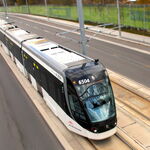spider
Senior Member
I drop in to this thread from time to time because I am a railway history fan as well as a modeller.
I haven't noticed any mention of fares to be expected on this HSR service, wouldn't this be a very important consideration in assessing it's viability? Porter fares are almost low enough to coax me into leaving the car at home now.
I haven't noticed any mention of fares to be expected on this HSR service, wouldn't this be a very important consideration in assessing it's viability? Porter fares are almost low enough to coax me into leaving the car at home now.




